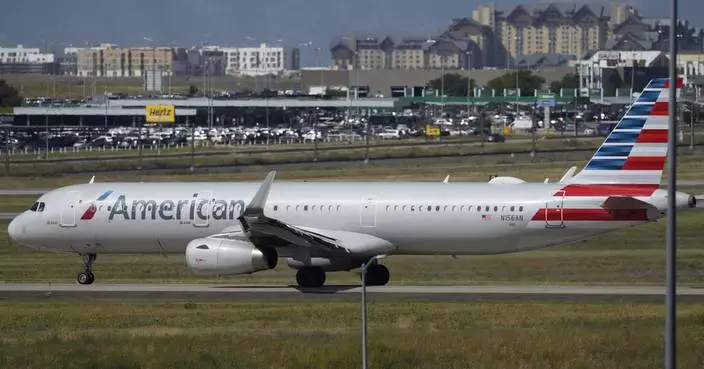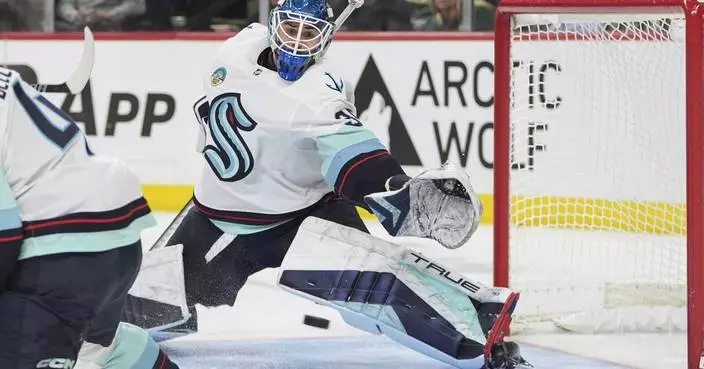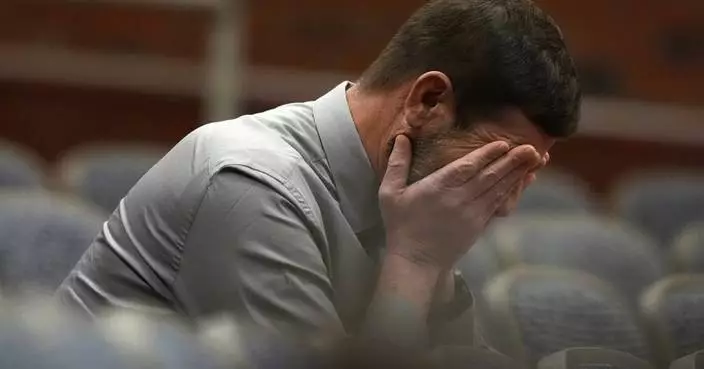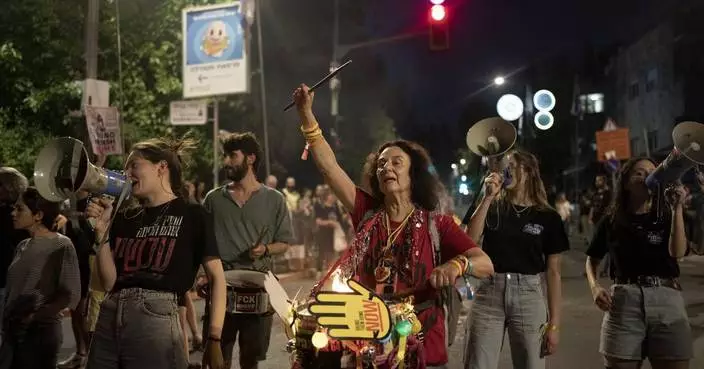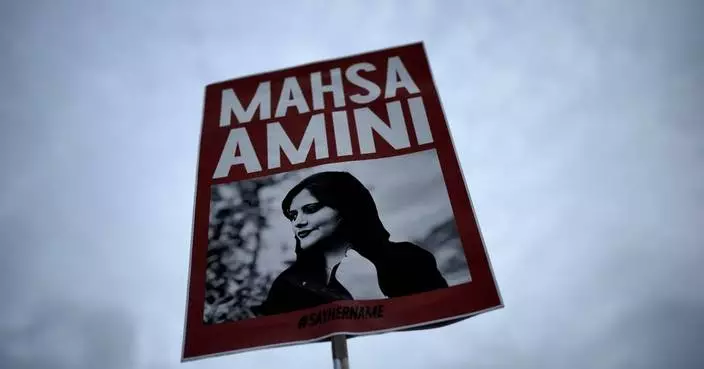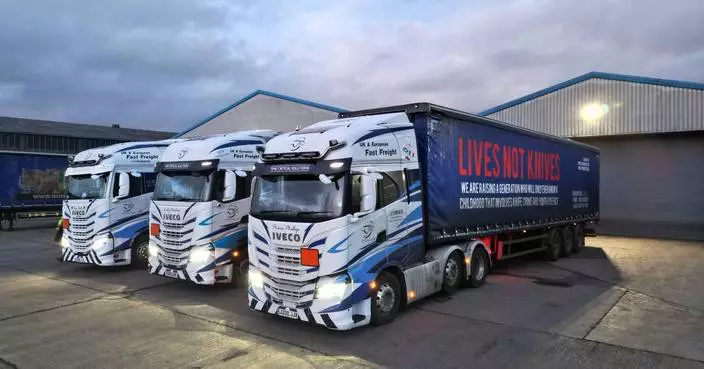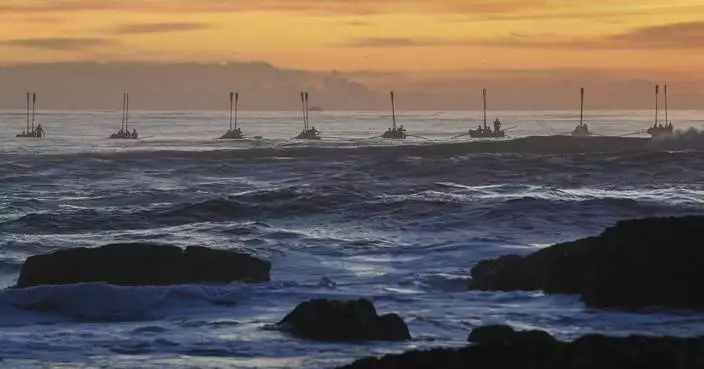The leaders of Russia, Turkey and Iran on Wednesday discussed ways to promote a peaceful settlement in Syria, including the return of refugees, humanitarian aid and prisoners' exchange, while fractured Syrian opposition groups were meeting in Saudi Arabia in a bid to overcome their divisions and form a united front for Syrian peace talks in Geneva.
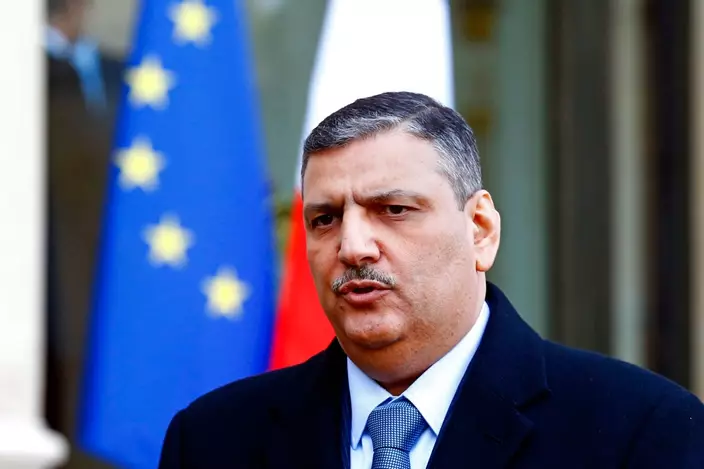
FILE - In this Jan. 11, 2016 file photo, former Syrian Prime Minister Riad Hijab, now coordinator of the Syrian opposition team talks to the press after his meeting with French President Francois Hollande at the Elysee Palace in Paris. (AP Photo/Francois Mori, File)
"Militants in Syria have received a decisive blow, and there is a real chance to put an end to the civil war that has raged for many years," Russian President Vladimir Putin said at the start of talks with Turkish and Iranian counterparts in the Russian Black Sea resort of Sochi.
Click to Gallery
The leaders of Russia, Turkey and Iran on Wednesday discussed ways to promote a peaceful settlement in Syria, including the return of refugees, humanitarian aid and prisoners' exchange, while fractured Syrian opposition groups were meeting in Saudi Arabia in a bid to overcome their divisions and form a united front for Syrian peace talks in Geneva.
"Militants in Syria have received a decisive blow, and there is a real chance to put an end to the civil war that has raged for many years," Russian President Vladimir Putin said at the start of talks with Turkish and Iranian counterparts in the Russian Black Sea resort of Sochi.
Speaking after the three-way talks, Putin said the Syrian leader pledged to conduct constitutional reforms and hold new elections under U.N. supervision.
They also called on other countries to provide humanitarian aid, clear Syrian territory of mines and restore vital infrastructure destroyed by the war.
They have sponsored several rounds of talks between the Syrian government and the opposition in Astana, Kazakhstan, and also have brokered a truce between Syria's government and the rebels in four areas, helping reduce hostilities.
De Mistura said he planned to have two rounds of talks in Geneva in December. He is set to travel to Moscow later this week.
Saudi Foreign Minister Adel al-Jubeir said in opening remarks that the opposition meeting comes amid international consensus to reach a resolution.
Turkey sees U.S.-backed Syrian Kurdish fighters as a terror group and an extension of Kurdish militants that have waged a three-decade-long insurgency inside its borders.
Putin noted that political settlement will require concessions from all sides, including Syrian President Bashar Assad's government.
Assad made a surprise trip to Russia late Monday for talks with Putin, which the Kremlin said were intended to lay the groundwork for Wednesday's trilateral meeting.
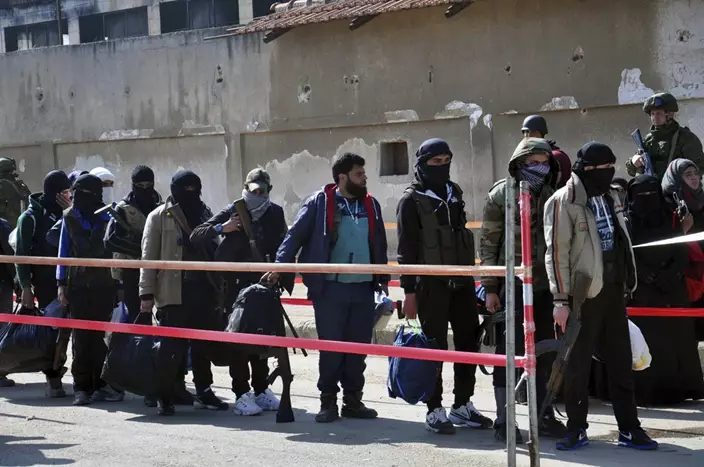
FILE --This April 1, 2017 file photo released by the Syrian official news agency SANA, shows anti-Syrian government fighters carrying their weapons and luggage, heading to a bus as they leave the last rebel-held neighborhood of al-Waer in Homs province, Syria. (SANA via AP, File)
Speaking after the three-way talks, Putin said the Syrian leader pledged to conduct constitutional reforms and hold new elections under U.N. supervision.
"The process of reforms isn't going to be easy and will require concessions and compromises from all those involved, including the Syrian government," he said.
In their joint statement after the talks, Putin, Iranian President Hassan Rouhani and Turkish President Recep Tayyip Erdogan emphasized the need for all parties in the Syrian conflict to release all prisoners and hostages, hand over bodies and search for those missing to help create conditions for a lasting cease-fire and the launch of political talks.
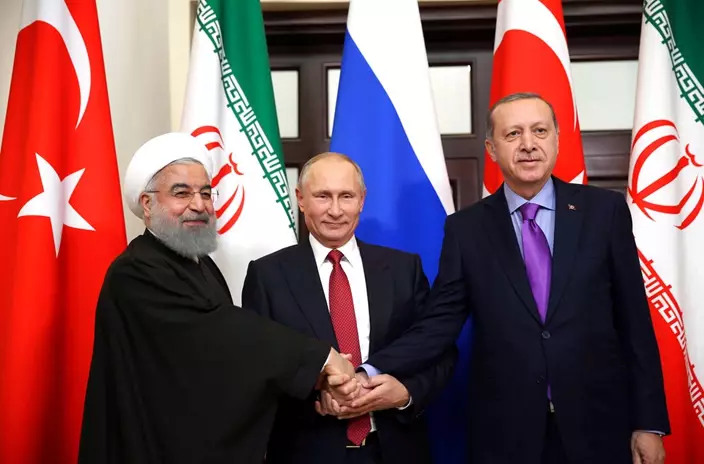
Turkey's President Recep Tayyip Erdogan, right, Russia's President Vladimir Putin, center, and Iran's President Hassan Rouhani pose for the media members in Sochi, Russia, Wednesday, Nov. 22. 2017.(Kayhan Ozer/Pool via AP)
They also called on other countries to provide humanitarian aid, clear Syrian territory of mines and restore vital infrastructure destroyed by the war.
"We have reached a consensus on helping the transition to an inclusive, free, fair and transparent political process that will be carried out under the leadership and ownership of the Syrian people," Erdogan said.
Even though Russia and Iran have backed Assad's government since the start of the Syrian conflict in March 2011, while Turkey has supported his foes, the three countries have teamed up to help mediate a peace settlement.
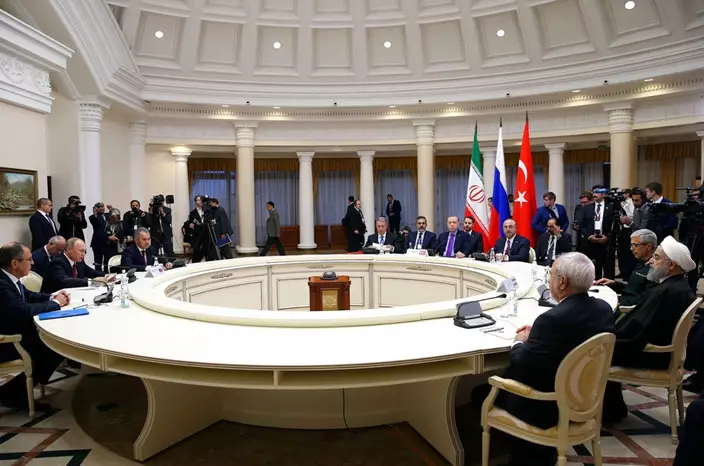
Turkey's President Recep Tayyip Erdogan, rear- third right, Russia's President Vladimir Putin, second left, and Iran's President Hassan Rouhani, foreground second right, sit during meeting in Sochi, Russia, Wednesday, Nov. 22. 2017. (Kayhan Ozer/Pool via AP)
They have sponsored several rounds of talks between the Syrian government and the opposition in Astana, Kazakhstan, and also have brokered a truce between Syria's government and the rebels in four areas, helping reduce hostilities.
U.N. deputy spokesman Farhan Haq, asked about the trilateral meeting of the leaders, said: "Our focus remains on the meetings that will begin in Geneva on Nov. 28. We hope that all the other processes that are underway will contribute to a successful round of talks in Geneva."
Meanwhile, the U.N. envoy for Syria, Staffan de Mistura spoke at the opening of a three-day gathering of the Syrian opposition in Riyadh, where around 30 opposition groups are expected to come up with a unified delegation and a vision for the Geneva talks.
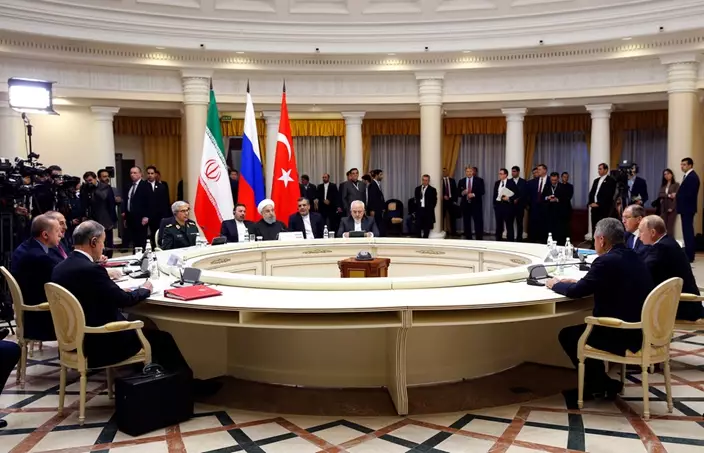
Turkey's President Recep Tayyip Erdogan, left, Russia's President Vladimir Putin, right, and Iran's President Hassan Rouhani, rear-centre, during a meeting in Sochi, Russia, Wednesday, Nov. 22. 2017. (Kayhan Ozer/Pool via AP)
De Mistura said he planned to have two rounds of talks in Geneva in December. He is set to travel to Moscow later this week.
"It is our common interest that today, you elect the best and most inclusive team among yourselves," de Mistura said. "A strong, unified team is a creative partner in Geneva and we need that."
The Riyadh meeting, however, has already been marred with disagreements. The notoriously fragmented opposition is divided by visions of a future role for Assad, the length of a transitional period as well as the constitution that will see the country move toward elections.
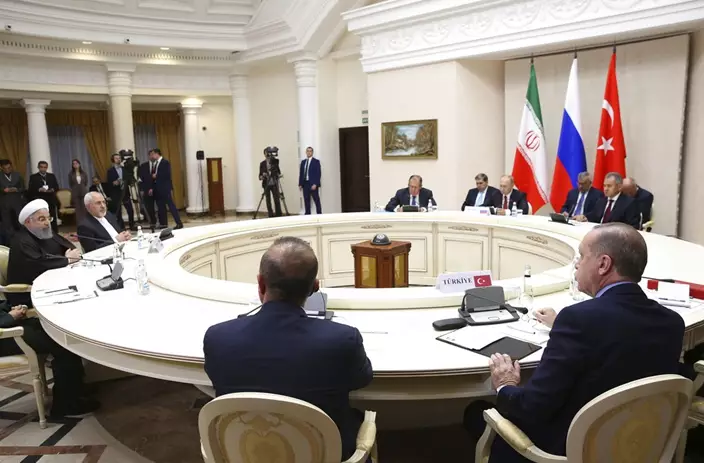
Turkey's President Recep Tayyip Erdogan, right, Russia's President Vladimir Putin, rear-centre, and Iran's President Hassan Rouhani, left, sit during a meeting in Sochi, Russia, Wednesday, Nov. 22. 2017.(Kayhan Ozer/Pool via AP)
Saudi Foreign Minister Adel al-Jubeir said in opening remarks that the opposition meeting comes amid international consensus to reach a resolution.
"There is no resolution to the crisis without Syrian consensus that achieves the demands of the Syrian people and ends their suffering," al-Jubeir said.
Russia, which has welcomed the Saudi efforts to unify the opposition, will also be hosting a meeting in Sochi that's expected to bring the opposition and Syrian government together in early December. Turkey and Iran pledged Wednesday to help the success of that meeting.
Earlier this month, the first attempt to convene it failed amid differences, reportedly including the participation of Kurds.
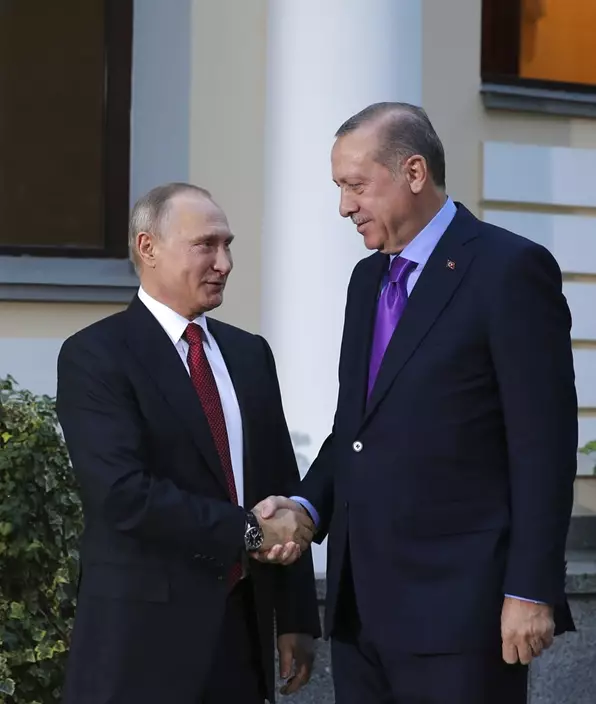
Turkey's President Recep Tayyip Erdogan, right, and Russia's President Vladimir Putin shake hands before a meeting with Iran's President Hassan Rouhani, in Sochi, Russia, Wednesday, Nov. 22. 2017.(Kayhan Ozer/Pool via AP)
Turkey sees U.S.-backed Syrian Kurdish fighters as a terror group and an extension of Kurdish militants that have waged a three-decade-long insurgency inside its borders.
Erdogan on Wednesday strongly reaffirmed Turkey's objection to Kurdish Syrian militia playing a part in negotiations on Syria's future.
"The exclusion from the process of terrorist elements that target Syria's political unity and territorial integrity as well as our national security will continue to remain our priority," he said. "No one should expect us to come under the same roof, to appear on the same platform as a terror organization."
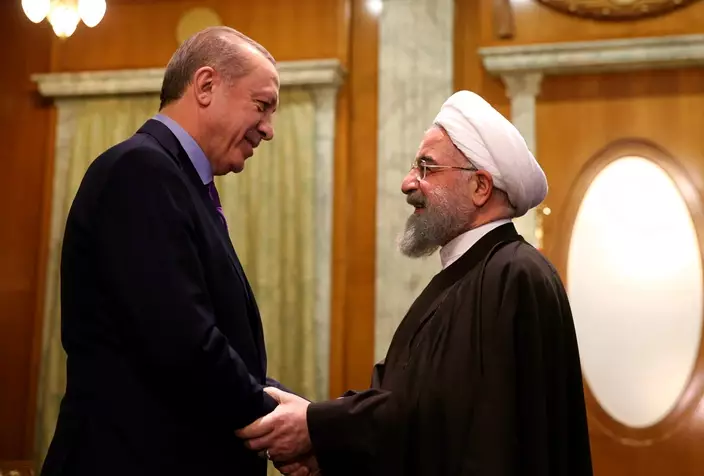
Turkey's President Recep Tayyip Erdogan, left, and Iran's President Hassan Rouhani greet each other before a meeting with Russia's President Vladimir Putin, in Sochi, Russia, Wednesday, Nov. 22. 2017. (Kayhan Ozer/Pool via AP)
Russia has been involved in a delicate diplomatic dance, trying to engage the Kurds without offending Turkey. Putin's spokesman, Dmitry Peskov, dodged a question about Kurdish participation in the planned Sochi meeting, saying only that it should be "inclusive."
Putin, whose military intervention in the war saved Assad's government from imminent defeat, called President Donald Trump, Saudi King Salman, Israeli Prime Minister Benjamin Netanyahu and Egyptian President Abdel-Fattah el-Sissi on Tuesday to brief them on his talks with Assad and coordinate the planned peace efforts.
Putin's broad outreach highlighted a key role Russia has come to play in the Syrian conflict and reflected Moscow's desire to engage all key players.
Some of the opposition delegations in Riyadh are backed by Gulf countries, which had sided with the anti-Assad rebellion, while others have been supported by Russia. Another opposition group is backed by Egypt, which has also kept contacts with the Syrian government.
The Saudi-owned Al-Arabiya TV said some members of the Russia-backed delegation withdrew from the meeting. A member of the delegation, Qadri Jamil, said they backed out to object other delegations putting conditions on the talks, including limiting a future role for Assad. The Russia-backed opposition is promoting political reform under Assad's rule.
WASHINGTON (AP) — The U.S. Supreme Court on Thursday took up Donald Trump's bid to avoid prosecution over his efforts to overturn his 2020 election loss to Democrat Joe Biden.
Trump’s lawyers argue that former presidents are entitled to absolute immunity for their official acts. Otherwise, they say, politically motivated prosecutions of former occupants of the Oval Office would become routine and presidents couldn’t function as the commander in chief if they had to worry about criminal charges.
Lower courts have rejected those arguments, including a unanimous three-judge panel on an appeals court in Washington. And even if the high court resoundingly follows suit, the timing of its decision may be as important as the outcome.
That’s because Trump, the presumptive 2024 Republican presidential nominee, has been pushing to delay the trial until after the November election, and the later the justices issue their decision, the more likely he is to succeed.
The court typically issues its last opinions by the end of June, which is roughly four months before the election.
Currently:
— What to listen for during Supreme Court arguments on Donald Trump and presidential immunity
— The Supreme Court will decide whether Trump is immune from federal prosecution. Here’s what’s next
— What to know in the Supreme Court case about immunity for former President Trump
— Trump is in New York for the hush money trial while the Supreme Court hears his immunity case in DC
— Follow the AP’s coverage of the U.S. Supreme Court at https://apnews.com/hub/us-supreme-court
Here's the latest:
Arguments before the U.S. Supreme Court have ended after more than 2 1/2 hours in Donald Trump’s bid to avoid prosecution over his efforts to overturn his 2020 election loss to Joe Biden.
The arguments had been scheduled to last for an hour but ran more than double the allotted time.
The case delved deep into the nuances of immunity, and key questions of when the high court might rule remain unclear.
The court usually releases its opinions by the end of June, and the timing of the ruling could be as important as the outcome.
At least five justices appeared likely to reject the claim of absolute immunity, but some also suggested that former presidents might have some immunity.
If their ruling reflects that and requires lower courts to then sort out whether immunity applies to Trump, it could push the trial past the November election.
The Supreme Court justices are keenly aware their decision on whether former commanders in chief have immunity will have huge implications not just for this case, but also far beyond this prosecution.
During arguments Thursday in Donald Trump’s bid to avoid prosecution over his efforts to overturn his 2020 election loss, Justice Neil Gorsuch told special counsel team lawyer Michael Dreeben they are “writing a rule for the ages.”
Justice Brett Kavanaugh concurred, adding: “This case has huge implications for the presidency, for the future of the presidency, for the future of the country.”
Dreeben is working hard throughout the arguments to make clear that a prosecution in this case would not open the floodgates to other criminal charges against future ex-presidents.
In response to a question about drone strikes authorized by former President Barack Obama, Dreeben said the U.S. government already analyzed that fact pattern and concluded that there was “no risk of prosecution for that course of activity.”
As Supreme Court arguments over immunity for Donald Trump stretched near the two-hour mark Thursday, special counsel team attorney Michael Dreeben got to the heart of the government’s case.
He ticked through the acts Trump is charged with, including a slate to elevate fake electors in battleground states, that he said were undertaken in Trump’s status as a presidential candidate and not a president.
Dreeben did, however, note that Trump’s interactions with Justice Department officials in his administration were perhaps protected acts.
The justices appeared highly skeptical of Trump’s claims of absolute immunity, but with arguments still underway, the essential question of when they might decide the case remains unclear.
The timing of their ruling could be as important as the outcome. At least five justices appeared likely to reject the claim of absolute immunity, but some also suggested that former presidents might have some immunity.
If their ruling reflects that and requires lower courts to then sort out whether immunity applies to Trump, it could push the trial past the November election. The court usually releases opinions by the end of June.
In oral arguments that have involved a lot of elevated legal jargon, the Supreme Court justices also sneaked in a few fun metaphors Thursday during Donald Trump’s bid to avoid prosecution over his efforts to overturn his 2020 election loss to Joe Biden.
Striking a skeptical note while questioning Trump lawyer D. John Sauer, Chief Justice John Roberts argued that expunging from the indictment acts that are official rather than personal would hobble the case, making it a “one-legged stool.”
Later, in conversation with special counsel team lawyer Michael Dreeben, Justice Samuel Alito brought up “the old saw about indicting a ham sandwich.” He was referring to the belief that indictments are easy to secure, and that they don’t necessarily indicate any likelihood of guilt.
Alito asked Dreeben whether he had come across a lot of cases in which a federal prosecutor wanted to indict a case and the grand jury refused. Dreeben said there are such cases, before Alito cut him off.
“Every once in a while there’s an eclipse, too,” Alito said, drawing some laughs in the courtroom.
The team under Special Counsel Jack Smith, which wrote that a lack of previous criminal charges “underscores the unprecedented nature” of what Donald Trump is accused of, is up before the Supreme Court in Trump's bid to avoid prosecution over his efforts to overturn his 2020 election loss to Democrat Joe Biden.
Michael Dreeben, a lawyer for the Smith team, said the court has never before recognized absolute immunity for a former president. “Such presidential immunity,” he said, “has no foundation in the Constitution.”
Justice Clarence Thomas asked Dreeben whether he was saying that there was no immunity even for official acts.
Dreeben said yes and also that impeachment and conviction before the Senate is not a prerequisite for a courtroom prosecution. Dreeben said there are plenty of checks to prevent politically motivated prosecutions.
Thomas said that other presidential acts in the past would have seemed ripe for prosecution and yet none occurred. Dreeben responded that the core distinction is that those other acts were not crimes.
Dreeben said the Smith team was not endorsing a system in which presidents would be exposed to prosecution for mistakes or bad judgments.
Justice Neil Gorsuch posed a line of questions Thursday that appeared friendly to arguments by Trump's lawyers in his bid to avoid prosecution over his efforts to overturn his 2020 election loss to Democrat Joe Biden.
Gorsuch suggested that if presidents fear they could be prosecuted after they leave office, they could begin preemptively pardoning themselves.
“We’ve never answered whether a president can do that. And happily, it’s never been presented to us,” he said.
But Justice Amy Coney Barrett took issue with a key argument of the Trump team — that under the Constitution, former presidents must be impeached and convicted before the Senate before they can be prosecuted in court.
Barrett said no one has ever suggested the justices would need to be impeached and convicted before they could be prosecuted. Trump lawyer D. John Sauer responded that under the Constitution, the sequence is only mandatory as it relates to former presidents.
Some Supreme Court justices posed scenarios or expressed skepticism Thursday as arguments started in Donald Trump’s bid to avoid prosecution over his efforts to overturn his 2020 election loss to Democrat Joe Biden.
Conservative Justice Samuel Alito said he considered it “implausible” that a president could legally order Navy SEALs to order the assassination of a political rival. That skepticism matters because the hypothetical is something the Trump team, which includes attorney D. John Sauer, has suggested could theoretically be protected from prosecution.
Conservative Justice Amy Coney Barrett asked Sauer a question that cut to the heart of the case, reading aloud allegations from the indictment and asking him to respond whether Trump’s actions in each instance were private or official.
Trump’s attorneys concede that immunity does not extend to personal actions but instead protects official acts. Sauer said he believed most of the acts are unquestionably official.
Chief Justice John Roberts, who could be a key swing vote, struck a skeptical note about the idea of expunging from the indictment acts that are official rather than personal, saying such a move would render the case a “one-legged stool.”
Liberal Justice Ketanji Brown Jackson said Sauer was asking for a change in the immunity law. She raised Richard Nixon’s pardon, asking, “I think that if everybody thought that presidents couldn’t be prosecuted, then what was that about?"
Liberal Justice Elena Kagan noted the Founding Fathers did not insert an immunity clause for presidents into the Constitution — but, she said, “they knew how to.”
Supreme Court Justice Clarence Thomas pressed Donald Trump's lawyer D. John Sauer at the outset of arguments Thursday, asking where the principle of absolute immunity comes from.
The question was the first during arguments at the Supreme Court in Trump’s bid to avoid prosecution over his efforts to overturn his 2020 election loss to Democrat Joe Biden.
Sauer fell back quickly on a Supreme Court case that’s core to the defense — a 1982 decision that held that former presidents are immune from civil lawsuits.
A skeptical Justice Sonia Sotomayor pointedly noted to Sauer that the indictment alleges that Trump acted for personal gain.
She said the Founding Fathers had contemplated the idea of immunity for presidents but had explicitly decided against it.
She made clear her opposition to the Trump legal team’s position, saying she was having a hard time envisioning immunity for a president who creates and submits false documents, orders the assassination of a political rival, and any number of other criminal acts.
First up on Thursday was D. John Sauer, making Donald Trump’s argument that he’s immune from criminal prosecution. A former Missouri solicitor general and onetime Supreme Court clerk, Sauer also represented Trump at the appeals court level.
Trump went to those arguments even though he wasn’t required to be there, but he won’t be in the audience at the Supreme Court today. He’s required to be in New York for his hush money trial.
About 30 demonstrators gathered outside the Supreme Court before arguments, some wearing judicial robes with kangaroo masks and others holding signs like “Justice Delayed Is Justice Denied.” That’s an apparent reference to the the timing of the high court’s ultimate decision in the case, which could determine whether a trial can be held before the election in November.
Shortly before arguments were slated to begin, Trump fired off a few posts Thursday on his social media network.
In one, he declared in all caps, “WITHOUT PRESIDENTIAL IMMUNITY, IT WOULD BE IMPOSSIBLE FOR A PRESIDENT TO PROPERLY FUNCTION, PUTTING THE UNITED STATES OF AMERICA IN GREAT AND EVERLASTING DANGER!”
Trump also said that without immunity, a president would just be “ceremonial” and the opposing political party “can extort and blackmail the President by saying that, ‘if you don’t give us everything we want, we will Indict you for things you did while in Office,’ even if everything done was totally Legal and Appropriate.”
Of the nine justices hearing the case, three were nominated by Trump — Amy Coney Barrett, Neil Gorsuch and Brett Kavanaugh. But it’s the presence of a justice confirmed decades before Trump’s presidency, Justice Clarence Thomas, that’s generated the most controversy.
Thomas’s wife, Ginni Thomas, urged the reversal of the 2020 election results and then attended the rally that preceded the Capitol riot. That has prompted calls for the justice to step aside from several court cases involving Trump and Jan. 6.
But Thomas has ignored the calls, taking part in the unanimous court decision that found states cannot kick Trump off the ballot as well as last week’s arguments over whether prosecutors can use a particular obstruction charge against Capitol riot defendants.
The justices will probably meet in private a short time after arguments to take a preliminary vote on the outcome. Chief Justice John Roberts would be a prime candidate to take on the opinion for the court, assuming he is in the majority.
They could simply reject Trump’s immunity claim outright, permitting the prosecution to move forward and returning the case to U.S. District Judge Tanya Chutkan to set a trial date.
They could also reverse the lower courts by declaring for the first time that former presidents may not be prosecuted for conduct related to official acts during their time in office. Such a decision would stop the prosecution in its tracks.
There are other options, too, including ruling that former presidents do retain some immunity for their official actions but that, wherever that line is drawn, Trump’s actions fall way beyond it.
Yet another possibility is that the court sends the case back to Chutkan with an assignment to decide whether the actions Trump is alleged to have taken to stay in power constitute official acts.
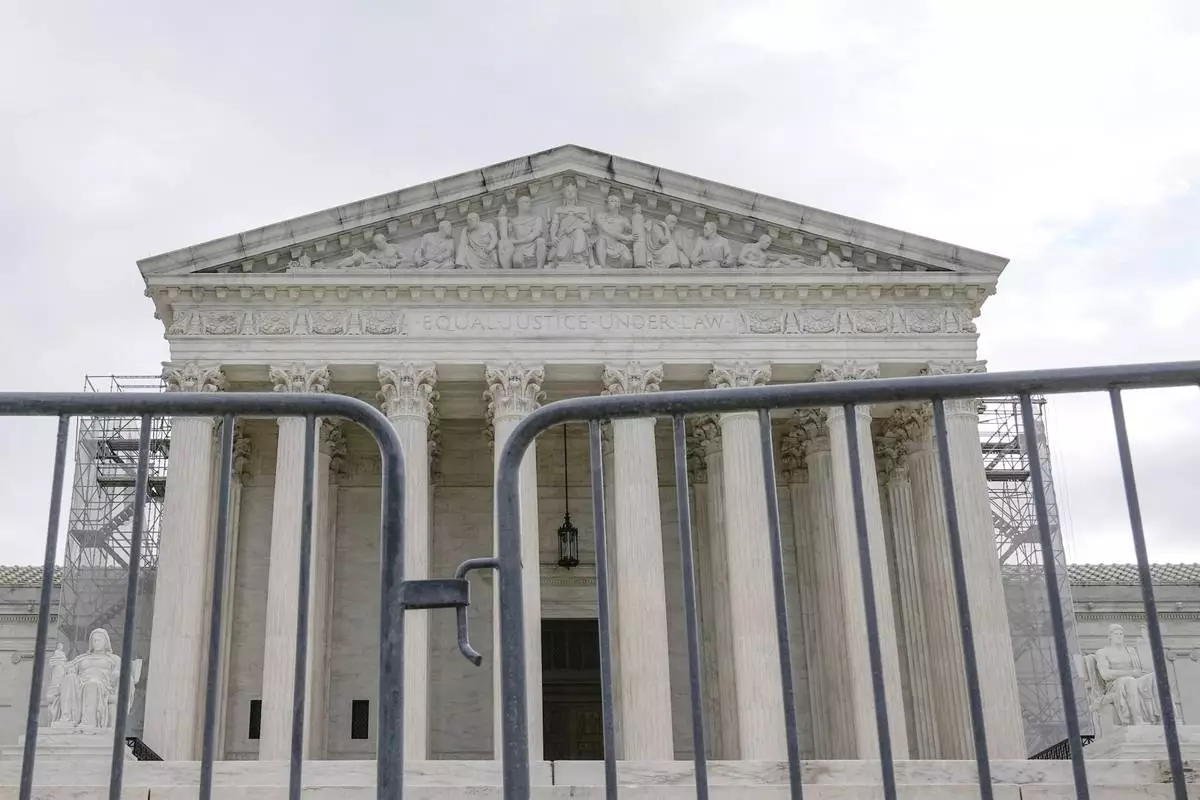
The Supreme Court is seen during a protest outside the as the justices prepare to hear arguments over whether Donald Trump is immune from prosecution in a case charging him with plotting to overturn the results of the 2020 presidential election, on Capitol Hill Thursday, April 25, 2024, in Washington. (AP Photo/Mariam Zuhaib)
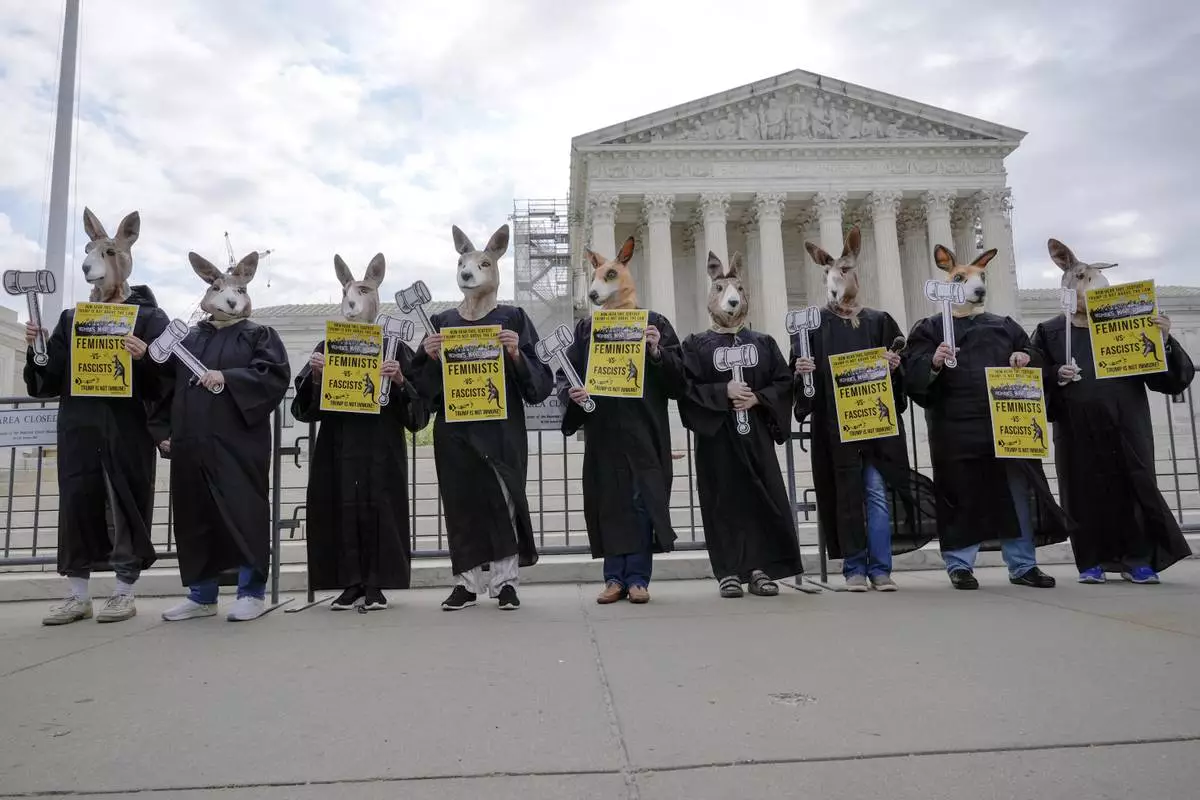
Demonstrators stand outside the Supreme Court as the justices prepare to hear arguments over whether Donald Trump is immune from prosecution in a case charging him with plotting to overturn the results of the 2020 presidential election, on Capitol Hill Thursday, April 25, 2024, in Washington. (AP Photo/Mariam Zuhaib)
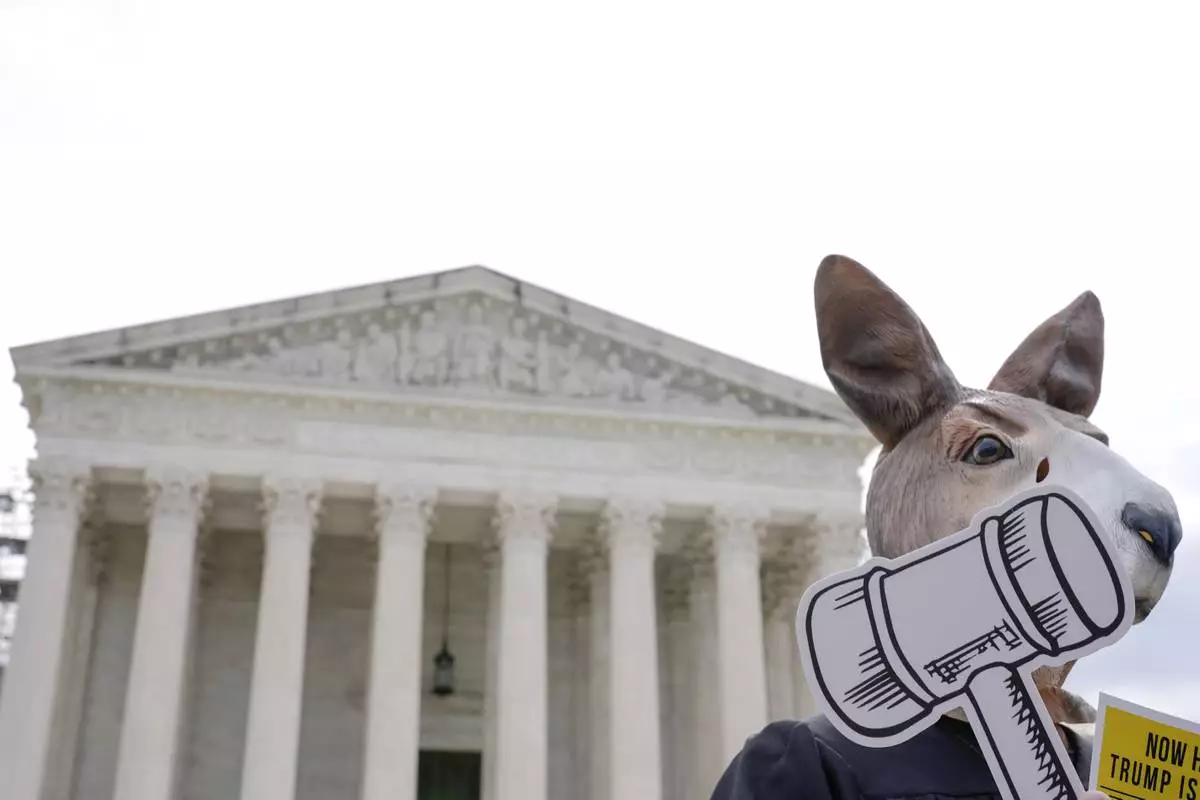
A demonstrator stands outside the Supreme Court as the justices prepare to hear arguments over whether Donald Trump is immune from prosecution in a case charging him with plotting to overturn the results of the 2020 presidential election, on Capitol Hill Thursday, April 25, 2024, in Washington. (AP Photo/Mariam Zuhaib)
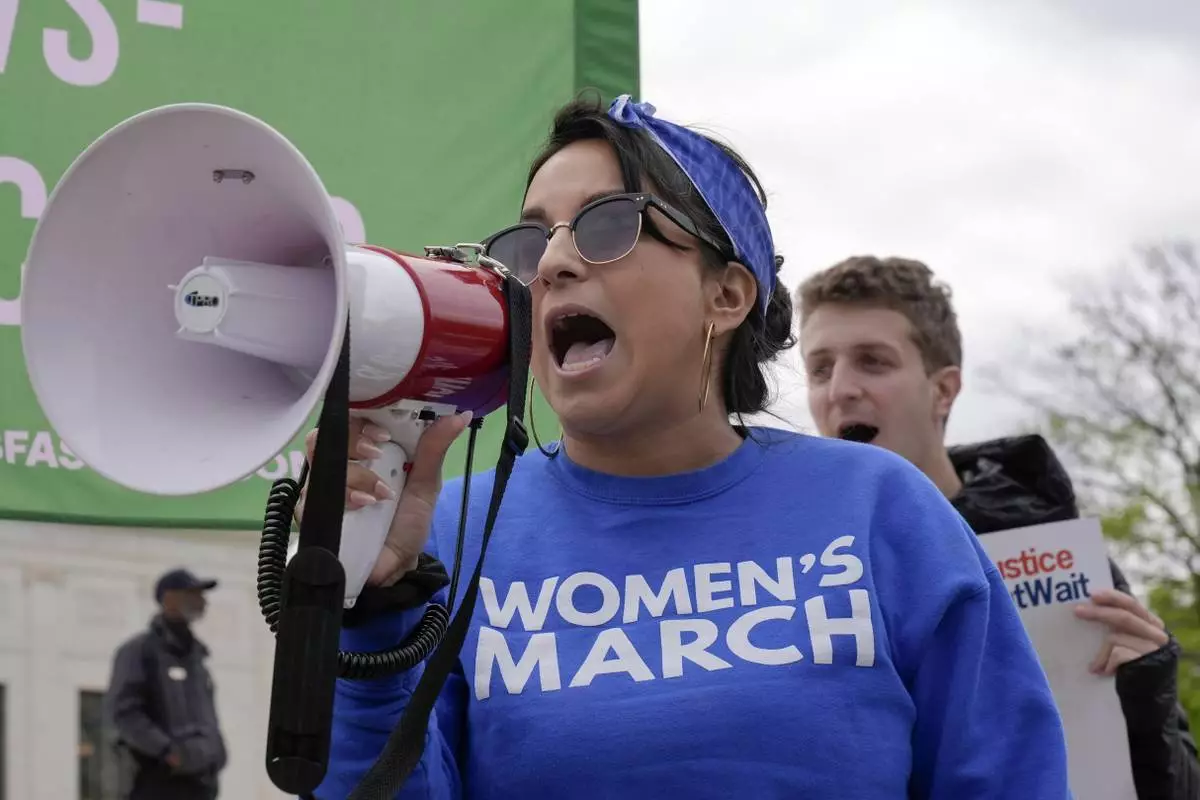
Demonstrators protest outside the Supreme Court as the justices prepare to hear arguments over whether Donald Trump is immune from prosecution in a case charging him with plotting to overturn the results of the 2020 presidential election, on Capitol Hill Thursday, April 25, 2024, in Washington. (AP Photo/Mariam Zuhaib)
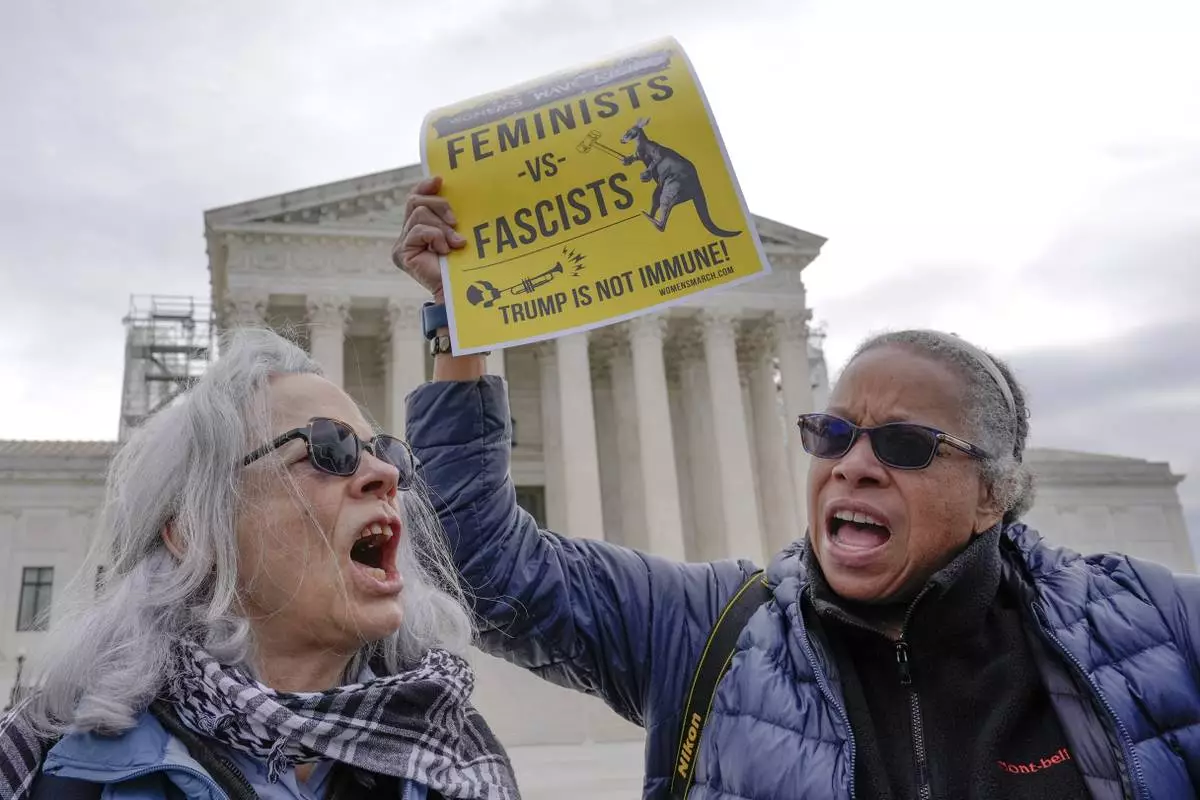
Demonstrators protest outside the Supreme Court as the justices prepare to hear arguments over whether Donald Trump is immune from prosecution in a case charging him with plotting to overturn the results of the 2020 presidential election, on Capitol Hill Thursday, April 25, 2024, in Washington. (AP Photo/Mariam Zuhaib)
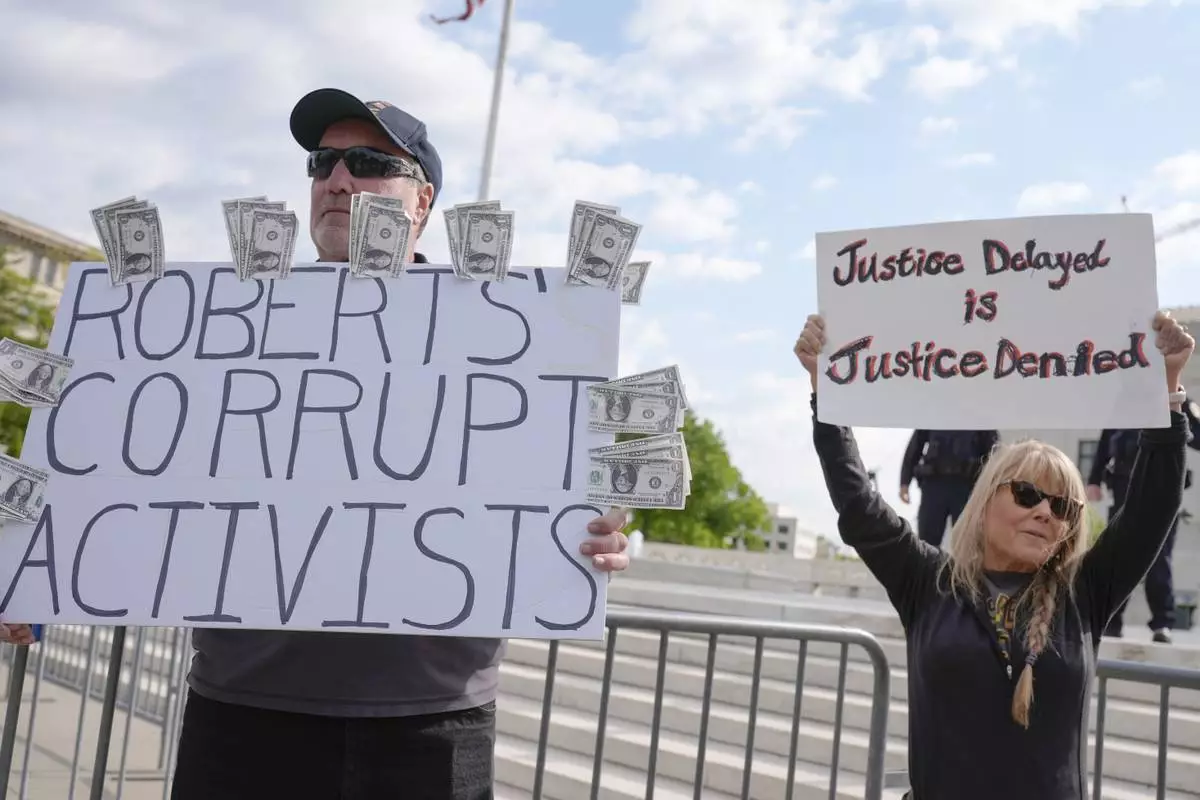
Demonstrates stand outside the Supreme Court as the justices prepare to hear arguments over whether Donald Trump is immune from prosecution in a case charging him with plotting to overturn the results of the 2020 presidential election, on Capitol Hill Thursday, April 25, 2024, in Washington. (AP Photo/Mariam Zuhaib)
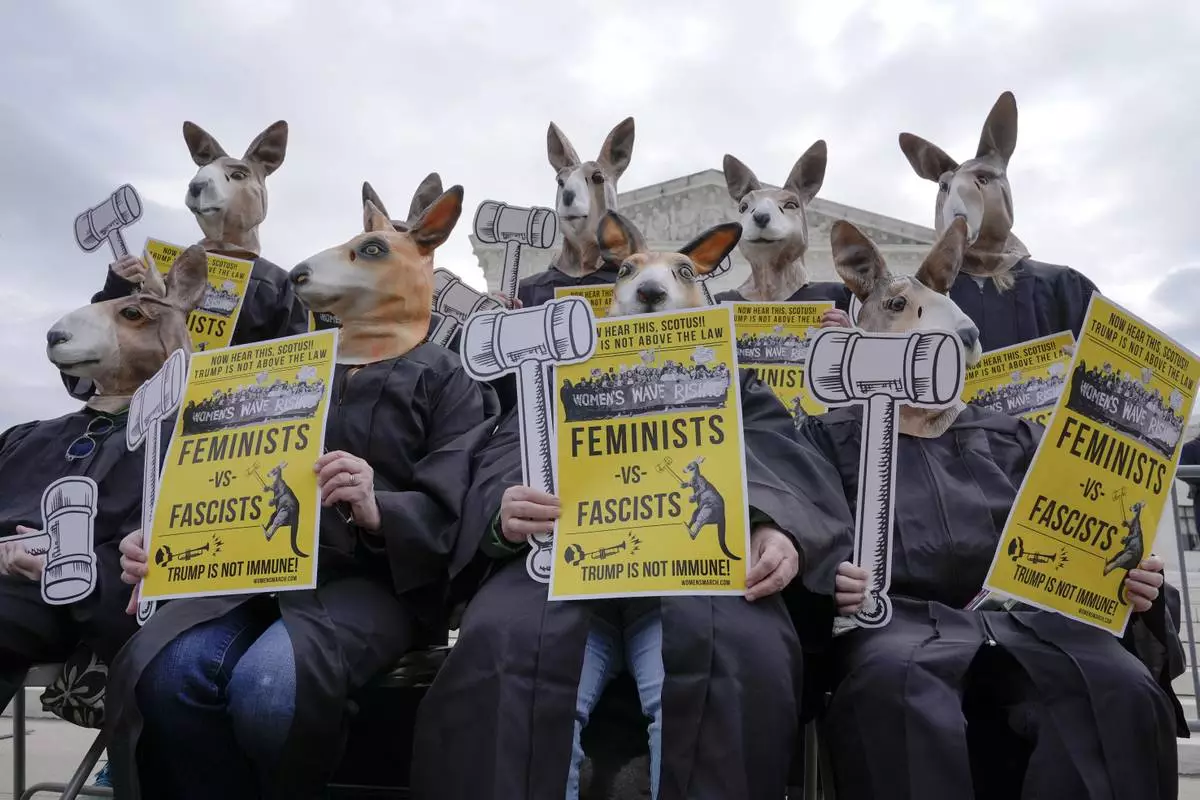
Demonstrates stand outside the Supreme Court as the justices prepare to hear arguments over whether Donald Trump is immune from prosecution in a case charging him with plotting to overturn the results of the 2020 presidential election, on Capitol Hill Thursday, April 25, 2024, in Washington. (AP Photo/Mariam Zuhaib)
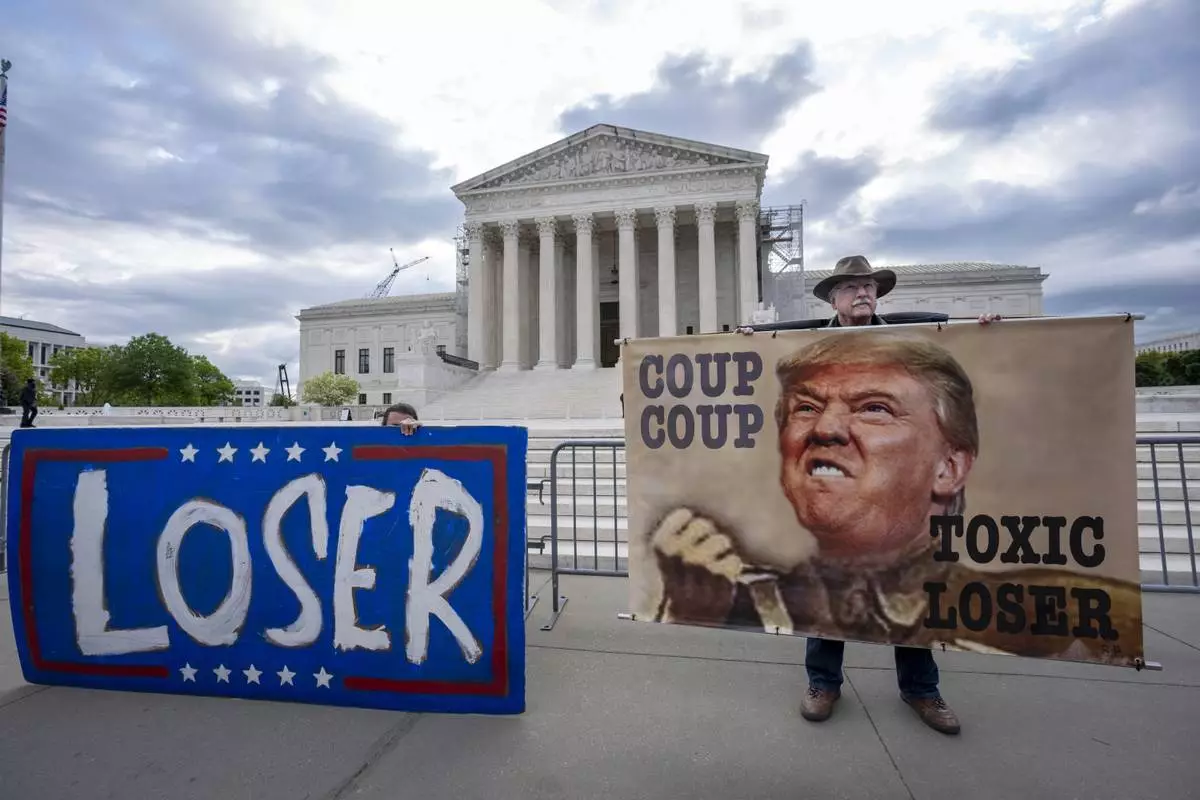
Activist Stephen Parlato of Boulder, Colo., right, joins other protesters outside the Supreme Court as the justices prepare to hear arguments over whether Donald Trump is immune from prosecution in a case charging him with plotting to overturn the results of the 2020 presidential election, on Capitol Hill in Washington, Thursday, April 25, 2024. (AP Photo/J. Scott Applewhite)



















